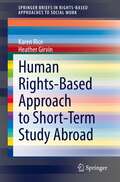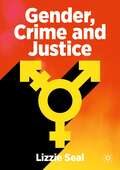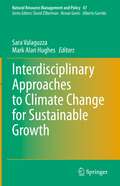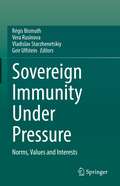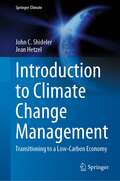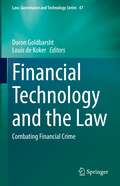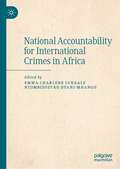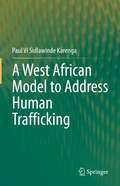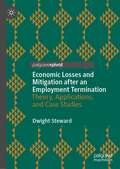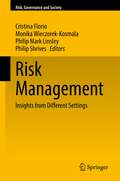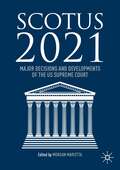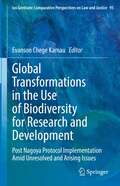- Table View
- List View
Bioeconomy and Sustainability: Perspectives from Natural and Social Sciences, Economics and Ethics
by Ulrich Schurr Dirk Lanzerath Christina Pinsdorf Mandy StakeIn this edited volume, scientists from different disciplines discuss modern biotechnological processes and a knowledge-based bioeconomy. The authors base their arguments on ecological, economic, legal, social and ethical aspects. Moreover, they explore the opportunities, risks, and challenges of bioeconomic concepts and biotechnologies in many subject areas. The chapters consider land use, nature and environment, nutrition, technology and governance, energy, economy, law and regulation, as well as ethics. A special focus should be on new technologies and how they can be used, without compromising the ambitious goal of creating a more sustainable, but also fair world. To do justice to this broad array of topics, the editors frame all topics in overarching introductions and close the volume with final conclusions. Thereby this volume offers data and critical thoughts for any member of a Bioeconomy – be it from academia, the industry or public regulation.
Human Rights-Based Approach to Short-Term Study Abroad (SpringerBriefs in Rights-Based Approaches to Social Work)
by Karen Rice Heather GirvinShort-term study abroad experiences are on the rise across social work programs. This increase is fueled by the Educational Policy and Accreditation Standards of the Council on Social Work Education (CSWE) that social work programs graduate students who are ready to engage diversity and function ethically as global citizens who understand mechanisms of oppression. With the increasing number of short-term study abroad trips, this brief offers a framework that provides strategies for empowering the populations and communities in which these trips occur. Developing short-term study abroad trips from a human rights-based framework rather than a needs-based approach is urgent and necessary, as the community in which the visit will occur is placed at the center of planning efforts and its members become equal and active participants. The brief is accessible and relevant to both instructors and students, with thoughtful emphasis placed in each chapter to align with the needs of each group more distinctly. It is conceived with both travel-based (field education) and classroom learning (pre-trip preparation) in mind. Though developed with more depth, theory, and evidence than a "how-to manual," the brief serves as an exemplary "guide" that prepares those engaging in short-term study abroad trips with information and strategies that are derived from the key concepts of a rights-based approach to field education. Human Rights-Based Approach to Short-Term Study Abroad is essential reading that engages students and faculty with case examples to illuminate the complex concepts that are taught by faculty as well as specific exercises and assignments to guide both faculty and student through the process of developing and implementing short-term study abroad trips. This brief is of immediate relevance for undergraduate and graduate coursework in field education, international social work, human rights, global social work, and macro social work, as well as useful for any practitioner seeking CSWE accreditation.
From Me to We: How Shared Value Can Turn Companies Into Engines of Change
by Jerry Haar Ricardo ErnstShared value is a management strategy in which companies find business opportunities in social problems. While philanthropy and CSR focus efforts focus on “giving back” or minimizing the harm business has on society, shared value focuses company leaders on maximizing the competitive value of solving social problems in new customers and markets, cost savings, talent retention, and more.This book takes the concept of shared value to the next level, with the concept of “Me to We” (also abbreviated as “M2W”) and discusses the current state of the business-environment-government relationship and shows how the shared value model can contribute to each entity. Citing real cases and examples from multiple industries, the authors show that shared value promotes shareholder interests while serving as a successful business strategy. Chapters explore the emerging phenomenon of shared value, the shareholder-stakeholder comparisons, the role of government in the stakeholder environment, shared value as it related to competitiveness, and operational issues such as implementation, communication, and leadership in their relationship to shared value.Readers will find useful strategies of Me to We and its implementation by firms that have become leaders in their market. They will receive ideas and insights into business strategies that will overshadow CSR activities as a differentiation or brand development strategy of the past.Featuring interviews with corporate executives offering their perspectives on shared value, this book will discuss shared value within the context of business and society, competitiveness, and globalization.
Gender, Crime and Justice
by Lizzie SealThis textbook takes a gender inclusive and intersectional feminist approach to examining key topics related to gender, crime and justice. It provides an overview and critical discussion of contemporary issues and research in this area suitable for use in undergraduate and postgraduate degree modules. A key feature of the book is its use of films, television series and documentaries to illustrate the concepts and findings from criminological research on gender, crime and justice. After outlining the meaning of gender and the perspective of intersectional feminism, it has chapters focused on interpersonal and sexual violence, sex work and the night-time economy, street crime, crimes of the powerful, policing and the courts, prison and community penalties and a final chapter on extreme punishment and abolitionist futures. It speaks to students and academics in criminology, sociology and gender studies.
Interdisciplinary Approaches to Climate Change for Sustainable Growth (Natural Resource Management and Policy #47)
by Sara Valaguzza Mark Alan HughesThe book is an edited collection of contributions by a distinguished international panel of academics on the main scientific, juridical, and economic aspects involved in the mitigation and adaptation processes imposed by climate change. Explicitly interdisciplinary, the book transversally cuts through different disciplines offering an outline of a phenomenon that is too often left to specific and sectorial insights. The volume is divided into four parts. The first part introduces the main concepts of the book: climate change and sustainability, wellbeing, and mitigation and adaptation. The second part presents the scientific understanding of climate change and explores some of the more pressing issues driving policy development, such as the melting of the glaciers and the impact on coastal areas. The third part discusses significant experiences in the environmental policies both in the European Union and in the United States of America. The last section explains possible approaches to climate change, by exploring the legal and economic aspects of both adversarial and more lenient approaches towards a more sustainable world. It faces four main issues in the economic and juridical context: consumer behaviors, climate litigations, environmental litigations and the alternative forms of dispute resolution on environmental matters, with particular regard to environmental mediation. Offering a new vision of sustainable policies, this volume will be of interest to researchers and students of environmental policy, resource economics, environmental law, sustainable development, and public administration, as well as practitioners and policy makers working in related areas.
Assigning Responsibility for Children’s Health When Parents and Authorities Disagree: Whose Child? (The International Library of Bioethics #90)
by Allan J. JacobsThis book provides a multidisciplinary analysis of the potential conflict between a government’s duty to protect children and a parent(s)’ right to raise children in a manner they see fit. Using philosophical, bioethical, and legal analysis, the author engages with key scholars in pediatric decision-making and individual and religious rights theory. Going beyond the parent-child dyad, the author is deeply concerned both with the inteests of the broader society and with the appropriate limits of government interference in the private sphere. The text offers a balance of individual and population interests, maximizing liberty but safeguarding against harm. Bioethics and law professors will therefore be able to use this text for both a foundational overview as well as specific, subject-level analysis. Clinicians such as pediatricians and gynecologists, as well as policy-makers can use this text to achieve balance between these often competing claims. The book is written by a physician with practical and theoretical knowledge of the subject, and deep sympathy for the parental and family perspectives. As such, the book proposes a new way of evaluating parental and state interventions in children's’ healthcare: a refreshing approach and a useful addition to the literature.
Sovereign Immunity Under Pressure: Norms, Values and Interests
by Geir Ulfstein Régis Bismuth Vera Rusinova Vladislav StarzhenetskiyThis book offers a critical analysis of current challenges and developments of the State immunity regime through three dimensions: it looks at State immunity from a comparative perspective; it discusses the major trends relating to the interplay between State immunity and the protection of human rights as well as counter-terrorism; and it examines the relationship between State immunity and the financial obligations of States. Part I, Sovereign Immunity from a Comparative Perspective: Weak v. Strong Immunity Regimes, deals with the diversity of existing regimes of State immunity at the national level. This part aims to explore different approaches of particular states to sovereign immunity and their general attitude to international law, and attempts to understand why some States favour a weaker State immunity regime by multiplying exceptions or interpreting them broadly, while others continuously support a stronger one and sometimes rely on the doctrine of absolute immunity. Part II, International Customary Law of Sovereign Immunity, Human Rights and Counter-Terrorism, highlights how human rights and counter-terrorism have shaped the law and practice of sovereign immunity. This part specifically discusses the role of national legislators and judges in the development of international law, emerging conflicts between national constitutional norms and the rules of international law concerning State immunity and human rights, and possible ways of their reconciliation. Part III, Sovereign Immunity of States and their Financial Obligations, contributes to on-going debates related to the mixed and complex nature of States’ financial obligations. In this part, authors elaborate on perceptions of the underlying public-private law divide, cross influences in public and private international law and their consequences for State immunity, as well as recent trends relating to immunity from execution.
Common Law – Civil Law: The Great Divide? (Law and Philosophy Library #139)
by Frederick Schauer Christoph Bezemek Nicoletta BersierThis book offers an in-depth analysis of the differences between common law and civil law systems from various theoretical perspectives. Written by a global network of experts, it explores the topic against the background of a variety of legal traditions.Common law and civil law are typically presented as antagonistic players on a field claimed by diverse legal systems: the former being based on precedent set by judges in deciding cases before them; the latter being founded on a set of rules intended to govern the decisions of those applying them. Perceived in this manner, common law and civil law differ in terms of the (main) source(s) of law; who is to create them; who is (merely) to draw from them; and whether the law itself is pure each step of the way, or whether the law’s purity may be tarnished when confronted with a set of contingent facts. These differences have deep roots in (legal) history – roots that allow us to trace them back to distinct traditions. Nevertheless, it is questionable whether the divide thus depicted is as great as it may seem: international and supranational legal systems unconcerned by national peculiarities appear to level the playing field. A normative understanding of constitutions seems to grant ever-greater authority to High Court decisions based on thinly worded maxims in countries that adhere to the civil law tradition. The challenges contemporary regulation faces call for ever-more detailed statutes governing the decisions of judges in the common law tradition. These and similar observations demand a structural reassessment of the role of judges, the power of precedent, the limits of legislation and other features often thought to be so different in common and civil law systems. The book addresses this reassessment.
Contemporary Management Education: Eight Questions That Will Shape its Future in the 21st Century (Future of Business and Finance)
by Piet Naudé“Why are we so important?”; “What value do we add?”; and “What good do we create?” These are the opening questions posed to management educators in this book. This is followed by uncomfortable questions about colonization (Who is in the centre and whose knowledge counts?) and inequality (Whom do we exclude?). After questioning the easy adoption of technology (What are we embracing?) and the challenge posed by global warming (Can management education help stop climate change?), the author ends by sketching some leadership lessons required for the future: “What lessons can we learn in a black swan event?” Mixing philosophical analyses with anecdotes from experience, the author does not shy away from discussing controversial views to give direction to current debates. Tracing eight such crucial questions and providing well-researched perspectives, this book is an engaging read for anyone interested in the future direction of business schools in particular and management education in general. “There are many books and articles on business education, but few as deep and insightful as Contemporary Management Education. I enthusiastically recommend it to anyone who seeks to understand and improve the training of business leaders.” Peter Tufano, Saïd Business School, University of Oxford “An amazing read. Piet Naude is eclectic and sparkling. He applies his talents to the wicked maze of management education in society. No issue is more important for global business. No writer is better qualified.” Thomas Donaldson, The Wharton School, University of Pennsylvania “A powerful, persuasive, and superbly compelling book. Contemporary Management Education serves as an invaluable and informative reference to the essential issues that are shaping the future.” Sherif Kamel, Dean, School of Business, The American University in Cairo
The Palgrave Handbook of Sexual Ethics
by David BooninThe Palgrave Handbook of Sexual Ethics is a comprehensive collection of recent research on the ethics of sexual behavior, representing a wide range of perspectives. It addresses a number of traditional subjects in the area, including questions about pre-marital, extra-marital, non-heterosexual, and non-procreative sex, and about the nature and significance of sexual consent, sexual desire, and sexual activity, as well as a variety of more recent topics, including sexual racism, sexual ableism, sex robots, and the #metoo response to sexual harassment. Each chapter defends a substantive thesis about the topic it addresses and the handbook as a whole thereby provides a strong foundation for future research in this important and growing field of inquiry.
Environmental Noise Control: The Indian Perspective in an International Context
by Naveen GargThis book provides a concise and up-to-date overview of environmental noise control issues, utilizing specific case studies from India to help explore noise mapping and monitoring, impact analysis, and policy, among other relevant topics. The book provides an extensive review of recent studies, including references, and describes the latest noise monitoring structures. It also addresses heretofore under-emphasized topics, including but not limited to acoustic metrology, Multi Attribute Decision Making (MADM) techniques, and sound insulation utilizing passive control strategies.
Introduction to Climate Change Management: Transitioning to a Low-Carbon Economy (Springer Climate)
by John C. Shideler Jean HetzelThis book provides climate students with the basic scientific background to climate change management. Students will learn about international and national approaches to climate change management defined in voluntary initiatives as well as in national law and international agreements. The book describes mitigation and adaptation measures, monitoring and reporting of greenhouse gas emissions, and strategies for achieving a low-carbon economy, including green finance.This book combines theory and practice, introducing students to the conceptual background but also taking a professional and technical approach with case studies and low carbon toolkits. Filled with didactic elements such as concept schemes, tables, charts, figures, examples, as well as questions and answers at the end of the chapters, this book aims to engage critical thinking and the discussion of important topics of our days.The low-carbon strategy is one of the answers to limiting the greenhouse effect on our planet. This strategy is to minimize the overall carbon consumption in the life cycle of the products we consume, from the extraction of raw materials to the end of their life. The future is being built today. This book will guide its readers along the path of imagining and realizing a low-carbon economy.”
Interdisciplinary and Social Nature of Engineering Practices: Philosophy, Examples and Approaches (Studies in Applied Philosophy, Epistemology and Rational Ethics #61)
by Paulo Fernando Ribeiro Antonio Carlos Zambroni de Souza Maarten J. VerkerkThis book covers practical and philosophical aspects of Engineering, paying special attention to the social impacts of emerging technologies. Some fundamentals of philosophy of technology are introduced followed by social, economic, and environmental discussion and implications in different disciplines. Each chapter provides insights on the responsibilities involved in the design of engineering projects. The examples presented combine concepts about the impacts of Engineering in society at the same time that incorporates new technological models, yielding an innovative approach about the topics.
Financial Technology and the Law: Combating Financial Crime (Law, Governance and Technology Series #47)
by Doron Goldbarsht Louis De KokerBlockchains and cryptocurrencies, open banking, virtual assets, and artificial intelligence have become the buzzword of this decade. This book focuses on these ‘disruptive’ financial technologies that provide alternatives to the traditional financial services typically offered by regulated financial institutions. Financial technologies are characterized by the innovative ways in which they initiate, support or extend traditional financial services or offer alternative financial pathways and products. However, these financial technologies also pose money laundering and terrorist and proliferation financing as well as cyber security risks that require mitigation. This edited volume addresses a range of regulatory and enforcement challenges related to financial technology and financial crime. The book responds to the United Nations’ Sustainable Development Goals, in particular in relation to economic development, employment, national security, law enforcement and social well-being. Fostering responsible financial innovation promotes long-term economic growth, inclusion, and improved living standards. This book explores how to promote financial innovation while mitigating risks in a way that ensures financial prosperity and social inclusion.
Artificial Intelligence in Cyber Security: Security Challenges, Technical and Ethical Issues, Forensic Investigative Challenges (Advanced Sciences and Technologies for Security Applications)
by Hamid Jahankhani Reza MontasariThe book provides a valuable reference for cyber security experts, digital forensic practitioners and network security professionals. In recent years, AI has gained substantial attention from researchers in both academia and industry, and as a result AI’s capabilities are constantly increasing at an extraordinary pace. AI is considered to be the Fourth Industrial Revolution or at least the next significant technological change after the evolution in mobile and cloud computing technologies. AI is a vehicle for improving the quality of our lives across every spectrum with a broad range of beneficial applications in various sectors. Notwithstanding its numerous beneficial use, AI simultaneously poses numerous legal, ethical, security and privacy challenges that are compounded by its malicious use by criminals. These challenges pose many risks to both our privacy and security at national, organisational and individual levels.In view of this, this book aims to help address some of these challenges focusing on the implication, impact and mitigations of the stated issues. The book provides a comprehensive coverage of not only the technical and ethical issues presented by the use of AI but also the adversarial application of AI and its associated implications. The authors recommend a number of novel approaches to assist in better detecting, thwarting and addressing AI challenges. The book also looks ahead and forecasts what attacks can be carried out in the future through the malicious use of the AI if sufficient defences are not implemented. The research contained in the book fits well into the larger body of work on various aspects of AI and cyber security.It is also aimed at researchers seeking to obtain a more profound knowledge of machine learning and deep learning in the context of cyber security, digital forensics and cybercrime. Furthermore, the book is an exceptional advanced text for Ph.D. and master’s degree programmes in cyber security, digital forensics, network security, cyber terrorism and computer science. Each chapter contributed to the book is written by an internationally renowned expert who has extensive experience in law enforcement, industry or academia. Furthermore, this book blends advanced research findings with practice-based methods to provide the reader with advanced understanding and relevant skills.
National Accountability for International Crimes in Africa
by Emma Charlene Lubaale Ntombizozuko Dyani-MhangoThis book critically examines the issues pertaining to the Rome Statute’s complementarity principle. The focus lies on the primacy of African states to prosecute alleged perpetrators of international crimes in their respective jurisdictions. The chapters explore states’ international and domestic obligations to hold perpetrators of international crimes to account before the national courts, and demonstrate the complexity of enforcing national accountability of alleged perpetrators of international crimes while also ensuring that post-conflict African states achieve national healing, reconciliation, and sustainable peace. The contributions reject impunity for international crimes whilst also considering these complexities. Emphasis further lies on the meaning of accountability in the context of the politics of selective international criminal justice for crimes committed before the establishment of the International Criminal Court.
A West African Model to Address Human Trafficking
by Paul V.I. KarengaThis book describes the nature of trafficking in persons in West Africa, focusing on labor and sexual exploitation in the region, and recommends tailor-made solutions established by the Catholic Church in light of governmental authorities’ failure to effectively combat this scourge of humanity. While states’ efforts to fulfill their international obligations in developing anti-trafficking legislations are recognized, their failure to carry out prosecutions of offenders and ensure protection of the victims reveals that law alone is not a sufficient instrument for realizing human rights and improving people’s lives. Faced with the sobering background of less than successful efforts by governmental entities to end the trade in humans, this research study recommends adopting essential elements of Catholic social teaching, which rests on the inherent dignity of human beings allowing the development of political, socio-cultural, and religious reforms that will increase the effectiveness of existing legislation designed to combat trafficking. This faith-based approach highlights the role that religion may play in fulfilling the discretionary provisions of the Palermo Protocol by promoting the welfare and protecting the life and dignity of the victims. Additionally, religion is composed of sound moral ethics that determine people's behavior to refrain from the sinful conduct of trafficking. It also creates a sense of ethical responsibility that promotes supply chain transparency and ethical purchasing as well as advocating social reforms and anti-trafficking legislations initiatives. In fact, the author's approach, may be a model for other regions in the world and will be of interest to scholars, law and policy makers, human rights advocates and law enforcement agents working in the field of trafficking in persons.
Spaceports in Europe (Studies in Space Policy #34)
by Annette FroehlichThis book explores how Europe is seeking to enlarge its launching capacities by building additional spaceports on the European continent. Various national initiatives are envisaged resulting in a “space race” in the field of constructing spaceports and building micro launchers. However, right from the beginning when choosing the launch site (land or sea based-rocket launches) there are various factors relating to international space law, European regulations and national rules that must be considered, as spaceports are rarely explicitly addressed in current legal and policy frameworks. While launching sites used to be operated by governments, private commercial initiatives are increasingly entering the field. This paradigm shift must be reflected within regulations relating to various aspects of space liability by enlarging the long-established terms of the United Nations space treaties to accommodate commercial space flights. Questions of permission, supervision and control require special liability regulations to avoid detrimental consequences stemming from the concept of “launching states” in view of the rise of private driven commercial space activities on a global level. Furthermore, not only do environmental aspects need to be thoroughly examined but also the concept of critical infrastructure requires special attention from a security perspective to anticipate, inter alia, cyber-attacks. For these reasons, several European and national regulations may need to be enlarged to apply to the entire space sector, using a harmonized approach that has direct implications for the regulations, programmes, and missions of the European Union and the European Space Agency, bearing in mind that the upcoming spaceports in Europe are an essential asset to substantially boost the European New Space.
Economic Losses and Mitigation after an Employment Termination: Theory, Applications, and Case Studies
by Dwight StewardThis Palgrave Pivot provides a conceptual and practical discussion of the factors that comprise a standard economic damage model in an employment termination case. This book discusses the economic factors and assumptions that comprise an economic damages model in an employment termination case. It also provides a discussion of the valuation of employee fringe benefits and employee stock option valuations. Background on the concept of discounting and discussions of the required information in employment cases are also provided. Readers are able to see the analysis in action, with case studies revolving around highly skilled individuals, less skilled individuals, public sector employees, highly educated individuals, managers and executives, and defamation and damage to reputation.
Risk Management: Insights from Different Settings (Risk, Governance and Society #20)
by Philip Shrives Monika Wieczorek-Kosmala Cristina Florio Philip Mark LinsleyThis volume offers new, convincing empirical evidence on topical risk- and risk management-related issues in diverse settings, using an interdisciplinary approach. The authors advance compelling arguments, firmly anchored to well-accepted theoretical frameworks, while adopting either qualitative or quantitative research methodologies. The book presents interviews and surveys with risk managers to gather insights on risk management and risk disclosure in practice. Additionally, the book collects and analyzes information contained in public reports to capture risk disclosure and perceptions on risk management impacts on companies’ internal organization. It sheds light on financial and market values to understand the effect of risk management on actual and perceived firm’s performance, respectively. Further, it examines the impacts of risk and risk management on society and the economy.The book improves awareness and advances knowledge on the complex and changeable risk and risk management fields of study. It interweaves among topical, up-to-date issues, peculiar, under-investigated contexts, and differentiated, complementary viewpoints on the same themes. Therefore, the book is a must-read for scholars and researchers, as well as practitioners and policy makers, interested in a better understanding of risk and risk management studies in different fields.
Doctoral Degree Programs in Law: An International and Comparative Study of the English-Speaking World (SpringerBriefs in Law)
by Kenneth K. MwendaThis book offers a critical and insightful study of various doctoral programs in law, focusing on the English-speaking world. That the structures of doctoral degree programs in law differ between the United States and much of the Commonwealth are an issue that requires no debate. What is missing in the discourse, however, is a narrative on how these programs are structured and how they compare. This book attempts to fill that gap. A key objective of the study is to provide an international and comparative analysis of the efficacy of the American- and British-styled models of law doctorates. In so doing, it provides a conceptual and theoretical framework for the development of effective doctoral programs in law, contending that the defining characteristic of a doctorate is that it recognizes an independent contribution to the subject rather than the completion of taught coursework, however, advanced. The book goes on to examine the concept of a higher doctorate in law as a possible means of strengthening the concept of a law doctorate in legal academia.This book was written against the backdrop of the recently adopted Global Convention on the Recognition of Qualifications concerning higher education. It was adopted by the UNESCO General Conference in Paris on November 25, 2019, making it the first United Nations treaty on higher education with a global scope. The target audience of the book includes scholars in higher education; scholars in legal education; law school deans and administrators; law professors and students; Ministries of Higher Education in countries around the globe; accrediting agencies for doctoral studies; bar admission and legal education societies; and UNESCO and other international organizations.
Domestic Violence in the Anglophone Caribbean: Consequences and Practices
by Ann Marie Bissessar Camille HugginsDomestic violence continues to be a social problem that is rarely understood or discussed in many parts of the world. The same holds true in the Anglophone Caribbean. The Caribbean context is unique as it was birthed out of colonization, which was violent and brutal for those who were forced to migrate from another country as enslaved labor, as well as for those who were conquered out of their lands. Most Caribbean islands’ societies were created and developed by slaves, colonizers, and indentured servants. This history has left an indelible scar on all involved, which is exemplified by the antagonistic way people interact, whether it is between races, ethnicities, religions, or gender. Traditionally, domestic relationships and causal factors for domestic violence has been investigated from a myriad of perspectives including the ethnic lineage of the participants. However, in the Caribbean due to its historic origins, domestic violence should also be examined through the lens of its colonial past. This book examines the consequences of allowing domestic violence to perpetuate in the region. It then looks at some of practices used to provide support and find justice for victims and perpetrators in a Caribbean cultural context.
SCOTUS 2021: Major Decisions and Developments of the US Supreme Court
by Morgan MariettaEach year, the Supreme Court of the United States announces new rulings with deep consequences for our lives. This fourth volume in Palgrave’s SCOTUS series describes, explains, and contextualizes the landmark cases of the US Supreme Court in the term ending 2021. With a close look at cases involving key issues and debates in American politics and society, SCOTUS 2021 tackles the Court’s rulings on voting rights, Obamacare, LGBT rights, climate change, college sports, property rights, separation of powers, parole for youth offenders, immigration, religious liberty, free speech, and more. Written by notable scholars in political science and law, the chapters in SCOTUS 2021 present the details of each ruling, its meaning for constitutional debate, and its impact on public policy or partisan politics. Finally, SCOTUS 2021 offers an analysis of the legacy of Justice Ruth Bader Ginsburg.
Understanding Cybersecurity Law and Digital Privacy: A Common Law Perspective (Future of Business and Finance)
by Arash Habibi Lashkari Melissa LukingsCybersecurity, data privacy law, and the related legal implications overlap into a relevant and developing area in the legal field. However, many legal practitioners lack the foundational understanding of computer processes which are fundamental for applying existing and developing legal structures to the issue of cybersecurity and data privacy. At the same time, those who work and research in cybersecurity are often unprepared and unaware of the nuances of legal application. This book translates the fundamental building blocks of data privacy and (cyber)security law into basic knowledge that is equally accessible and educational for those working and researching in either field, those who are involved with businesses and organizations, and the general public.
Global Transformations in the Use of Biodiversity for Research and Development: Post Nagoya Protocol Implementation Amid Unresolved and Arising Issues (Ius Gentium: Comparative Perspectives on Law and Justice #95)
by Evanson Chege KamauEnough laws have been enacted since the adoption of the Nagoya Protocol on access and benefit-sharing to permit a study which is capable of accurately portraying the status quo of national implementation of the Protocol and the ensuing practice, emerging challenges and how countries are coping with them. This book, one of the first to present such a study, uniquely combines an examination of the new laws and practice and how they comply with the Nagoya Protocol; of issues not yet resolved by the Protocol and which solutions are being explored; and of how research and development is responding to the new situation. In addition, it proposes solutions to selected questions on ABS based on real-world and hypothetical cases, which could instigate litigation.Written by a team of expert academics and practitioners in the field, this book makes a valuable contribution to academic and policy debates and to academic literature on international environmental law, international biodiversity law, international property law, climate law and the law of indigenous populations. It also offers a reference guide for practicing lawyers in the area of ABS.

